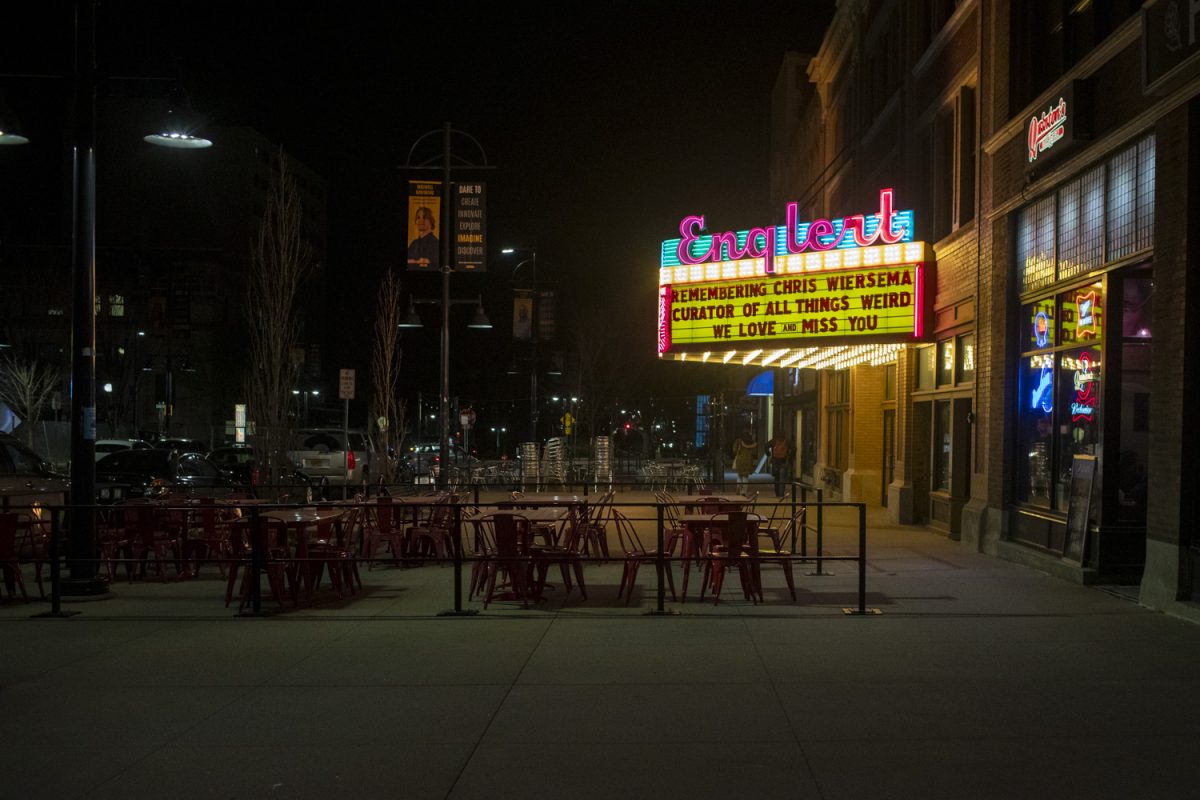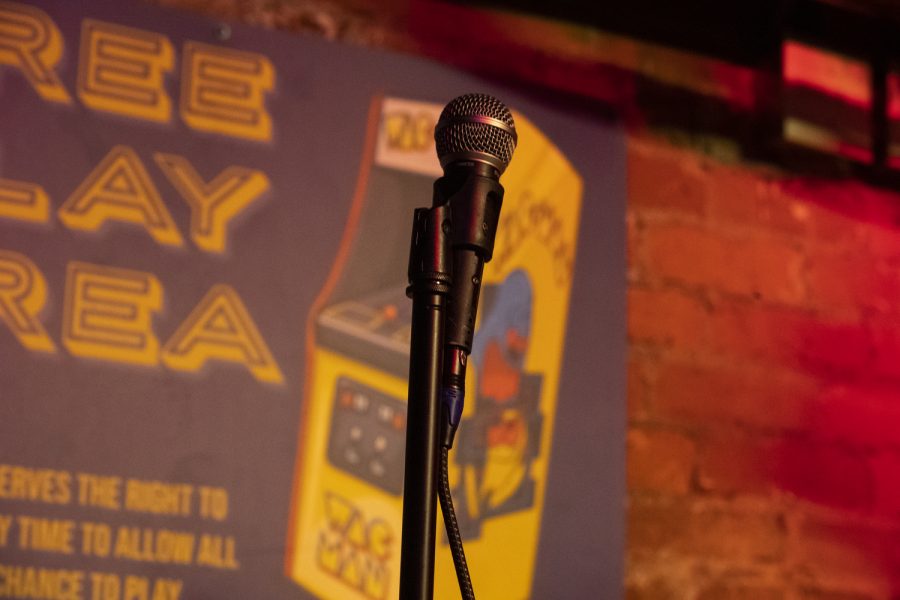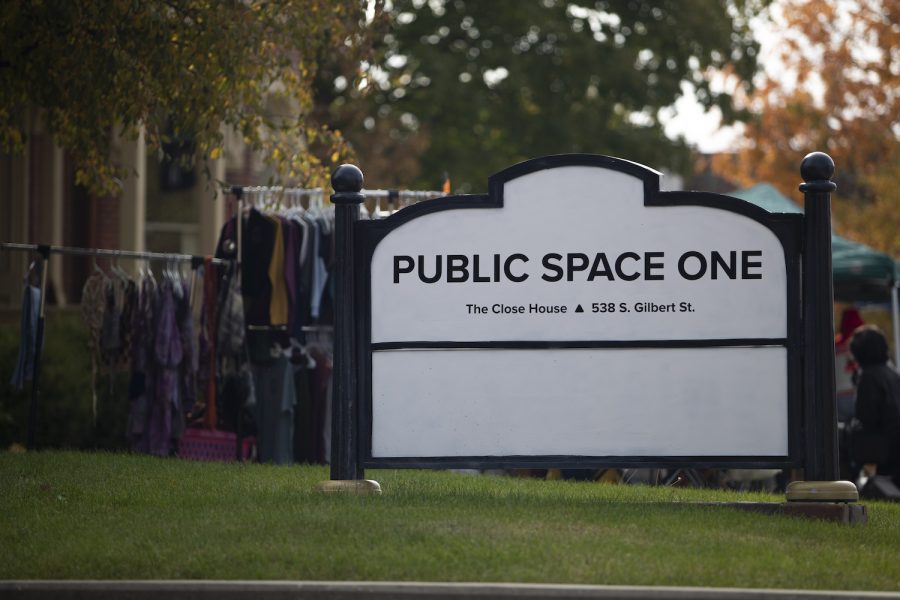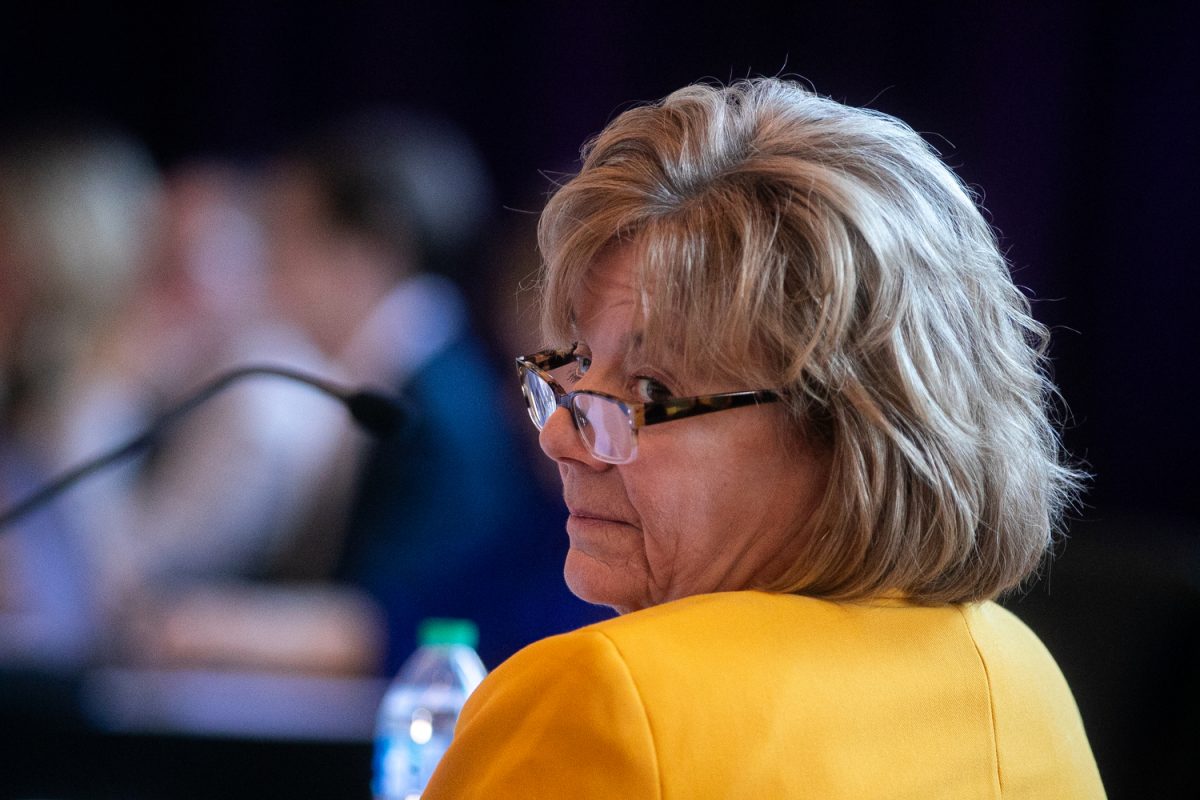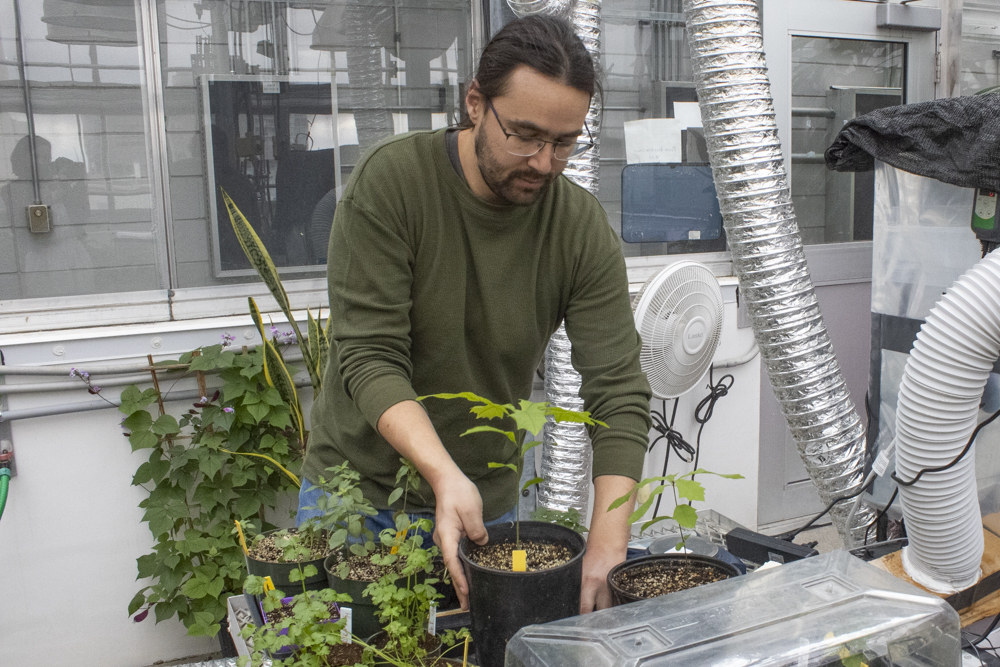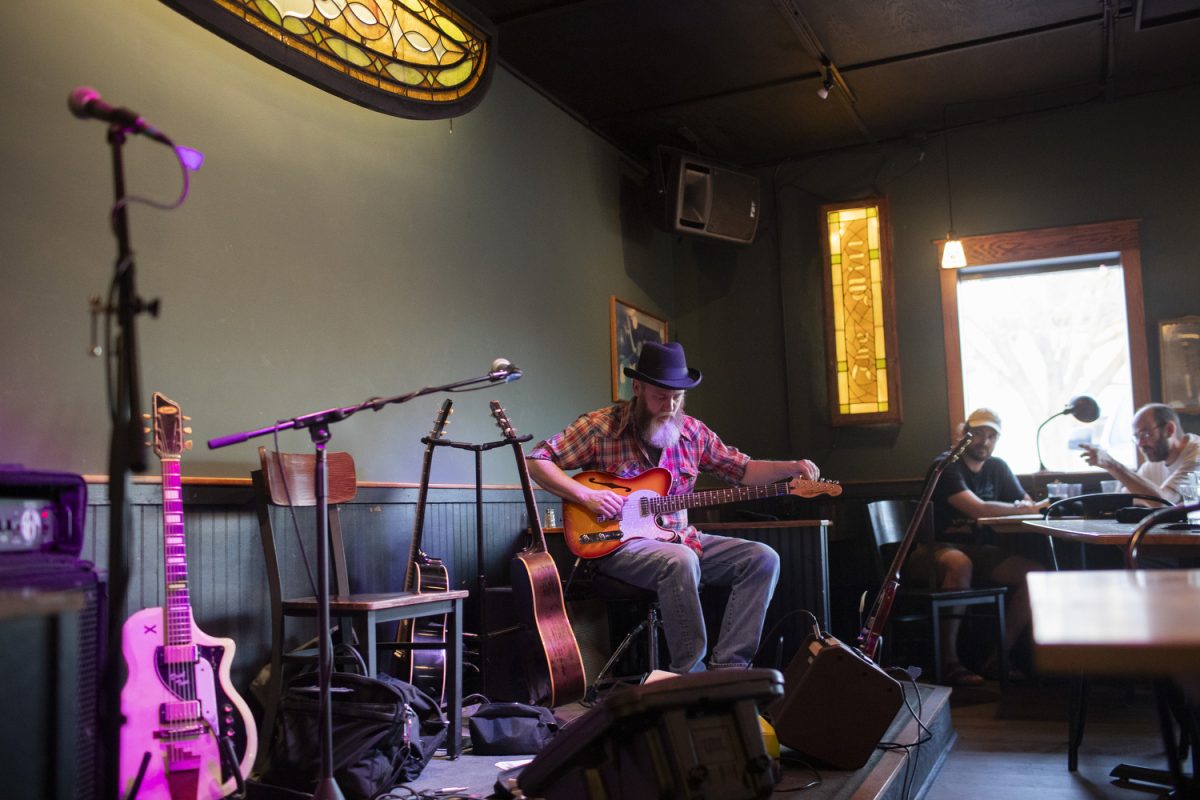If you’ve ever attended a show at the Englert Theatre, Gabe’s, Trumpet Blossom Cafe, or the James Theatre, you have likely met Chris Wiersema.
But you wouldn’t spot him on the stage or even in the program credits. Rather, he was the kind, sharp-witted, and unconditionally welcoming usher who was the first to greet you at the door.
Wiersema never sought credit for his work, despite planning, funding, and sourcing talent for countless performances. Instead, he preferred the spotlight be on the artists, from small and local to globally acclaimed, whom he brought to venues of all sizes in Iowa City.
Illuminated with bold colors in the daytime and bright lights at night, the words on the Englert’s marquee currently read: “Remembering Chris Wiersema, curator of all things weird. We love and miss you.”
Wiersema, 43, died unexpectedly on March 13, rattling community members in Iowa City and beyond.
He is survived by his wife Anne Marsh, his father and brother Douglas Wiersema and Kevin Wiersema, respectively, in-laws Dawn Elizabeth Marsh and Timothy Weston Marsh, sister-in-law Danielle Wiersema, and nephews Trey and Dylan Wiersema, according to his obituary.
A public memorial service will be held on April 7 at the Englert to honor Wiersema’s life. Even with its 725-seat theater, Brian Johannesen, the current programming director of the Englert, said the venue not only anticipates reaching capacity but could be too small of a space to hold the number of people Wiersema impacted.
“There are people all over the world who know about Iowa City because of Chris. He put Iowa City on the map and made it a haven for people who felt like they didn’t belong anywhere else,” Johannesen said. “That is why this room will be filled with 700 of his best friends.”
Whether they met him in passing, were an artist he booked, or one of his closest friends, dozens — if not hundreds — of people from around the world have taken to social media to share memories of him.
Wiersema’s palpable loss has also led some to fear a loss of progressive music in Iowa City.
“He had a commitment and dedication [to his work] that is so exceedingly rare in this town, in this state, and in this world,” Luke Tweedy, a local music producer and a good friend of Wiersema, said. “Chris is irreplaceable.”
When Tweedy first met Wiersema in 2001, he worked as the manager of Record Collector, a record store downtown. Wiersema, who had just moved to Iowa City from Naperville, Illinois, to attend the University of Iowa, often wandered in looking for new music.
At first, Tweedy said, dishing out recommendations to him was easy; Wiersema was not only receptive to his music suggestions but had a seemingly unquenchable thirst for more.
At some point, finding new music to recommend to Wiersema became a challenge for both Tweedy and the then-owner Kirk Walther. Wiersema’s collection, and subsequently his music knowledge, became so expansive that their roles eventually flipped; Wiersema was dropping names even Tweedy didn’t know.
“He knew more than I did, more than Kirk did — He ingested music at such a high pace,” Tweedy, who worked at the record store from 1998-2013, said.
Wiersema’s taste stretched to the far corners of niche, alternative music genres. Over time, he would come in asking for music the store didn’t even carry.
“From the store’s point of view, it makes a lot more sense to do your homework on stuff you’ll sell a lot of copies of,” Tweedy said. “Chris’ music [taste] — you couldn’t sell a lot of copies of.”
Though he grew up in a suburb of Chicago and was privy to the city’s revolving door of new music, Wiersema’s appreciation for sound was instead born out of dire necessity.
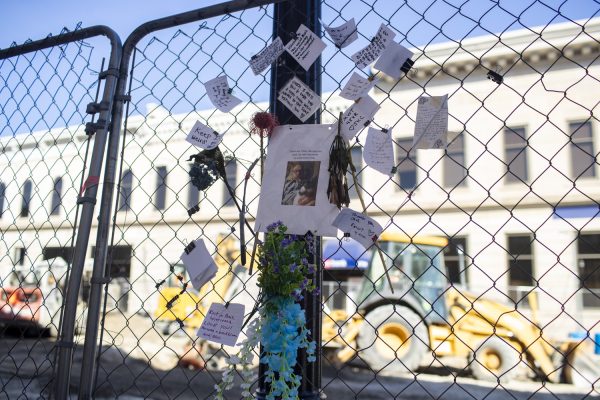
During a rough patch in his teenage years, Wiersema was sent to a reform school in the Dominican Republic. There, isolated from contemporary American media, he was deprived of an experience most take for granted: developing his own music taste.
In its place, Wiersema took to appreciating the banal sounds heard in his everyday life. The screech of a car brake outside his window, the metallic scrape of a nearby factory, and the rev of a motorcycle engine became his instruments.
However, this difficult experience was ultimately formative for Wiersema; it shaped his complex taste in music and, upon returning home, he took with him a newfound ability to find art and beauty in the mundane — an ability that would later become one of the defining characteristics of his impact on the community.
Shortly after he arrived in Iowa City, Wiersema immersed himself in his college town’s small but mighty alternative underground music scene.
In 2006, Wiersema began managing the live music venue formerly known as the Picador, which reopened as Gabe’s a month after its closure in 2010.
There, Wiersema made a name for himself as someone who had an ear like a Bloodhound’s nose. He was constantly discovering new sounds in places most others wouldn’t think to look.
Both through the music he created in his own bands — Lwa, with his friend Matt Schettler, and Death Bag with his friend Gabi Vanek — as well as the artists he brought to Iowa City, Wiersema toyed with a level of nuance, absurdity, and unconventionality that stuck with his listeners long after a show, sometimes in uncomfortable ways.
“I’ve spent my whole life with music; I record 60-70 records a year — I’m surrounded by music,” Tweedy explained. “The only time I’ve had a panic attack was at one of Chris’ shows because the music was so challenging to me, and it made my skin crawl in such a particular way.”
However, Wiersema’s events were so revolutionary in their ability to instill unsettling feelings that some audience members who removed themselves from the performance for their own sanity would stick around in the lobby after the show to discuss its ingenuity.
Before meeting Wiersema, Kembrew McLeod, the University of Iowa department chair of communication studies and a highly respected music scholar, had written extensively about environmental sound art, or the practice of actively listening to the naturally occurring sounds in one’s environment.
McLeod understood it on an academic level, but it wasn’t until he experienced the music Wiersema brought to Iowa City that he understood the art form at his core.
“Chris’ series of programming, which asked audiences for some of our time and attention to open up our ears to hear our environment, allowed us to hear traditional instruments in completely new ways,” McLeod said. “I learned some deep lessons about being present — being human — through sitting through a number of his events.”
Often, however, Wiersema wouldn’t see a penny from these shows. In fact, he would regularly lose money.
Pete McCarthy, who took ownership of Gabe’s in 2012, said it wasn’t uncommon for Wiersema to dip into his own savings or allow artists to sleep on his couch to ensure their booking, most of whom typically saw a turnout he could count on one hand.
However, this never deterred Wiersema, who saw a greater wealth in sonic gain rather than monetary.
“He would joke, ‘I could either go buy a plane ticket and travel to see one of these bands, or I could lose all that money on a show and get to see them here at Gabe’s,’” McCarthy shared. “He took risks, and he felt that we all needed to hear this music.”
Over the next three years, Wiersema worked tirelessly to bring his out-there taste to venues across Iowa City, including the former Mill, the Englert, and Yacht Club, as well as to local house shows. Tweedy described this as a “debaucherous time,” in which Wiersema worked countless late nights and early mornings.
During this period, however, Wiersema met his wife, Anne Marsh. A revered tattoo artist herself, Marsh is described in his obituary as one of the only people who could outdo both his wit and his charisma. In 2009, Wiersema became the programming director of The Mission Creek Festival, an annual music festival hosted by the Englert in Iowa City.
Johannesen, who joined as a producer a year later, said he was intimidated by Wiersema and his work. Once the two started collaborating, Johannesen’s awe for Wiersema only grew.
“That’s when I learned just how smart and gifted he was at analyzing music and articulating why something was or was not important,” Johannesen said. “He had this knack for just finding people nobody’s ever heard of doing something nobody else was doing.”

Johannesen said when booking an artist, Wiersema didn’t care if they were popular, he only cared whether they were “good.” Because of this, the musicians he found were often so underground — sometimes located halfway around the world — that booking them required more digging than merely emailing an agent.
He said Wiersema would spend hours tracking artists down to gauge their interest in performing in Iowa City. Whether they gave him a date two months or two years into the future, Wiersema always followed through with a show.
From there, Wiersema championed Iowa City’s unconventional and underground music scene through the connections he built with artists he believed in.
“His taste was so eclectic that it made a really unique thing [in Iowa City] — especially when he started Feed Me Weird Things — because he was not tied to a venue, he was tied to the artist,” Johannesen said. “His goal was to put that artist in the best place he could find for them to succeed.”
Feed Me Weird Things, a concert series Wiersema founded in 2017, was his musical brainchild. It allowed him to become independent in his programming and, thus, bring esoteric music to more local venues — from nationally recognized concert halls to parking lots and churches.
The Trumpet Blossom Cafe was one of these venues and, by many accounts, the concert series’ home base. When owner Katy Meyer opened the vegan restaurant in 2012, Tweedy helped build the stage that would eventually host many of Wiersema’s shows.
“Every year, it was more and more impressive and unbelievable the people he got to come through town,” Meyer said. “In the past year or two, so many of the acts he had here — they’ll never play a room this small ever again. There are nationally recognized musicians who know about [Trumpet Blossom] because of what Chris did.”
Over more than a decade of collaboration, Wiersema and Meyer hosted hundreds of legendary artists at Trumpet Blossom, diverse not only in their sounds and popularity but in their identities as well.
According to Meyer and many others who worked with him, Wiersema prioritized a shift away from what he recognized as an overwhelmingly white, heteronormative scene in most music programming, and sought to showcase a diversity of voices in his own. This was especially pronounced in his festival FEaST, a four-day annual summer concert series he started in 2022.
“He wanted to make the community aware of itself, of the different facets that are here, and that you can enjoy art in nontraditional spaces,” Meyer said. “A piece of this place died with him.”
Andre Perry, the executive director of Hancher Auditorium and one of Wiersema’s closest friends, said Wiersema’s capacity for impact in his community was tangible through even short interactions.
“Even if you only talked to him a couple of times, you were like, ‘Oh, this dude is part of the fabric of this town and in some way cares about me and my cultural wellbeing,’” Perry said. “That vibe was felt with so many people.”





